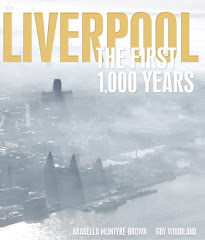
Sport in this city means two things: Liverpool or Everton. Football is genetic here, in the blood, whether it’s red or blue. But beyond the all-pervasive roar of the footie crowd, there is a whole lot of other sport going on, whether to local, national or international standards – or at street level. For heaven’s sake – the world’s single biggest sporting event, watched by over one billion people all over the planet in 2001, is staged in Liverpool each spring. If it’s not immediately obvious, read on. It’s not the Derby which, despite being run at Epsom these days, is named after its founder the Earl of Derby (as in West Derby, Liverpool), owner of Leasowe Castle, who first ran the race in 1780 over the Leasowes. Racing had been going on for much longer: there was horse-racing over Kirkdale sands to celebrate Elizabeth I’s ascension to the throne in 1558, and in 1577 Mr Torbock donated a silver bell for the winner of a race each year on Ascension Day.
Before either Everton or Liverpool Football Clubs were even thought of, Liverpool Rugby Club was going strong; the oldest rugby club in the world, it was founded in 1857; three of the England team in the first ever rugby international match (1871) were Liverpool players, and in 1914 the captains of England, Scotland and Ireland were all Liverpool members. Waterloo RC, incidentally, has produced five England captains.
Smaller, cleaner and more colourful than footballs, snooker balls are made at Clare’s in St Anne Street, and the firm has the world’s only snooker museum. Exhibits include an eight-sided table, and cues used by cavalry officers on India’s North-west Frontier in the 1870s – where snooker was invented. Liverpool lad John Parrott shot to fame when in 1991 he beat ‘the Tornado’ Jimmy White to become world snooker champion.
On wheels, Liverpool has a long pedigree: the Liverpool Self-propelled Traffic Association organised a trial for self-propelled vehicles on Everton Brow in 1896. On two wheels, Liverpool Velocipedes was the first cycling club, and Pete Matthews Cycles in Lower Breck Road was established in the 1930s by cycling expert Jim Soens and bought by Matthews – also a top racer, in 1972. Matthews’ customers come to the crowded little shop from all over Europe to have their bikes quite literally tailor-made for them, down to the last millimetre.
Boxing glory most recently came via John Conteh, world light-heavyweight champion in 1974, but Jem Mace (who died in 1910) had the longest boxing career of all time: 36 years.
Swimming is producing some strong contenders – Catherine Smith was in the first-ever relay team to swim the length of Loch Ness and back, in 26 hours 13 minutes; in the Sydney Olympics 2000, Stephen Parry came sixth in the 200m butterfly, and has his attention fixed on Athens for 2004.
And this being a maritime city, watersports are popular; the biennial Lyver Trophy, organised by the Liverpool and Royal Dee Yacht Clubs, is a 180-mile race from the Mersey and is now a qualifier for the Fastnet race. Sailors don’t have to go into international waters for a thrill – in the first-ever Mersey Regatta (1828) there was a severe thunderstorm.
Although Liverpool hasn’t produced a Scouse Tiger Woods yet, golf is an abiding passion here; there are 34 golf courses on Merseyside, including Royal Birkdale (where the 100th British Open was held,) and Royal Liverpool on the Wirral….

No comments:
Post a Comment